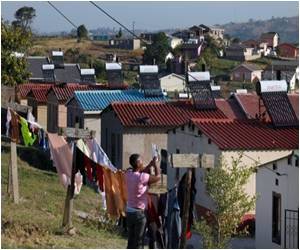Los Angels residents have rejected Measure B, a massive solar power project, but activists are persisting in their efforts.
Los Angels residents have rejected Measure B, a proposal for a massive solar power project, but activists are persisting in their efforts.
As part of the city's plans to generate 10% of its electricity needs from solar energy by 2020, Measure B would have allowed the Los Angeles Department of Water and Power to install up to 400 MW of solar on municipal rooftops by 2014 - a plan to drape 1,500 acres of silicon panels across the city’s roofs, as someone described it.The idea was to place solar photovoltaic systems throughout the city and connect them to the city's existing electrical grid. The DWP would own and maintain the solar panels. It would also have meant considerable job generation at a time of grave downturn.
Mayor Antonio Villaraigosa who was behind the idea got re-elected, but Measure B was defeated narrowly, by a thousand votes, it was announced Thursday.
Foes had complained that the plan had only three weeks of public discussion before the City Council placed it on the March 3 ballot.
Even the leading Los Angeles Times campaigned against the Measure. “How much will it cost ratepayers? Is it financially feasible? How much money will it take to recruit and train new workers?" it asked and charged, "The process seems designed to get voters to sign off on a plan without sufficient knowledge of it, and it is undermining a broader discussion of solar power in Los Angeles.”
Criticism intensified after The Times reported that city officials had obtained a confidential analysis warning that the solar plan could lead to considerably higher electricity bills.
Advertisement
But many felt uneasy over the lack of transparency. Voters interviewed at polling places on Tuesday said that while they strongly back solar energy, the plan didn’t sit right. “Just because the idea sounds reasonable, it doesn’t mean the ballot measure is,” said playwright Jonathan Dorf after voting in Hollywood. Dorf said that he had seen the TV ads and glossy mailers, but learned more from local media.
Advertisement
Environmentalists and labor leaders won't give up though, as yet. They said they would continue to press the municipal utility to achieve Measure B's core mission of installing the panels, with or without voter approval.
Brian D'Arcy, who heads the union that represents DWP workers, said the ballot measure remains a good plan even though Los Angeles residents "voted the wrong way."
"It's the kind of thing our president was talking about. It puts people back to work where they live," said D'Arcy, business manager for International Brotherhood of Electrical Workers Local 18. "I am not discouraged because it's the right thing to do, and I'm going to keep pressing them to do it."
Measure B opponent Jack Humphreville said he believed the city could still come up with a coherent plan for adding solar panels.
But he called for a greater emphasis on "feed-in tariffs," which would require the DWP to purchase power from private companies that install solar panels on the roofs of homes and businesses.
"I don't think this should be something where the DWP goes into a backroom and decides with the union and the mayor," he added.
Still, Humphreville's suggestions set up a confrontation with the electrical workers' union, which has voiced strong skepticism about some of the DWP's other solar plans.
D'Arcy accused DWP General Manager H. David Nahai of placing too much emphasis on feed-in tariffs, which he described as a giveaway to big business, and too little on the ballot proposal.
"He is not a friend of Measure B, and the department as it relates to Mr. Nahai was not a proponent of Measure B," D'Arcy said.
Nahai said that, as a public official, he could not campaign for Measure B in the weeks leading up to the election. But Nahai said he has long favored a plan that allows the DWP to own and install a significant number of solar panels -- and told the council so during hearings last year.
"This is not a time for finger-pointing," he added. "It is a time to move forward. And as I said, this was not a vote against solar, nor was it a vote against city-owned solar. The misgivings had to do with other issues."
Source-Medindia
GPL









